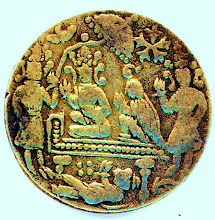

King Edward VII Reign 22 January 1901 - 6 May 1910
Edward VII (Albert Edward; 9 November 1841 – 6 May 1910) was King of the United Kingdom of Great Britain and Ireland, King of the Commonwealth Realms, and Emperor of India from 22 January 1901 until his death on 6 May 1910.
Before his accession to the throne, Edward held the title of Prince of Wales, and has the distinction of having been heir apparent to the throne longer than anyone in English or British history.[1] During the long widowhood of his mother, Queen Victoria, he was largely excluded from wielding any political power but came to represent the personification of the fashionable, leisured elite.
Edward's reign, now called the Edwardian period after him, saw the first official recognition of the office of the Prime Minister in 1905. Edward played a role in the modernization of the British Home Fleet, the reform of the Army Medical Services,[2], and the reorganisation of the British army after the Second Boer War. His fostering of good relations between
He was the first British monarch of the House of Saxe-Coburg-Gotha, which was renamed by his son, George V, to the House of Windsor.
King Edward succeeded by his Son King George V.
The Coin above minted by East India Company during King Edward Rule.

No comments:
Post a Comment